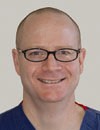Each Tuesday, the Daily Voice features a first-person narrative from a researcher explaining the science behind a recent grant, and the inspiration or impetus behind becoming a scientist at UMass Medical School. If you know of a researcher you’d like to see profiled, send an email to UMassChanCommunications@umassmed.edu.
|
Edward Boyer, MD, PhD, professor of emergency medicine, talks about his grant,A Mobile Enabling Technology to Promote Adherence to Behavioral Therapy, National Institute on Drug Abuse; two years, $1 million. |
 |
Many medical conditions require that patients modify their behavior, but much of the effort directed toward changing behavior has not produced real improvements in health. For example, my doctor may teach me some strategies to prevent overeating, but I may forget or even ignore them when I am confronted with food that I crave. Our goal is to take interventions from the sterile environments where they are taught and better transform them to the real world settings where they must be applied. So, we wanted to provide a mobile “coach”—in our case, a smartphone running artificial intelligence software—that can recognize when a patient is experiencing a threat to their health and deliver a highly personalized intervention precisely at the moment of greatest need.
This line of investigation has the capacity to change how behavioral interventions are delivered. That sounds kind of dry until you realize that almost all of the expensive and difficult-to-treat medical problems require that patients change their behavior.
I grew up in rural Mississippi, and although there are some enormous advantages to being a child in that sort of environment, it is nonetheless a place where opportunity is somewhat limited. Science is a great way to broaden one’s horizons, to create opportunities.
I’d like to say that coming to UMass Medical School to do my research was the result of thoughtful planning, but it was more akin to serendipity. When I completed my fellowship in medical toxicology, UMMS had the only job opening for someone with my training. It was blind luck that I found a departmental of emergency medicine that actually emphasizes academics and obtaining NIH funding.
What I find most exciting about my job is that I can do things that will really help people by doing super-sexy-cool research. That’s a great way to hallow anyone’s days.